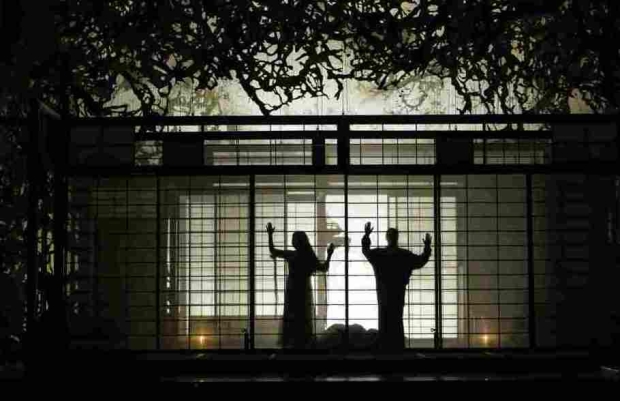Review: Madam Butterfly (Wales Millennium Centre and tour)
Welsh National Opera revives Joachim Herz’s ancient production for its spring tour

© Jeremy Abrahams
I need to pick a careful path through this review of Madama (here Madam, despite being sung in Italian) Butterfly, so let me begin by confessing that I saw the alternate cast of this revival and neither the opinion nor the star rating should be considered reliable guides to those who catch Karah Son and Jonathan Burton as Cio-Cio-San and Lt Pinkerton.
It’s only a few months since I praised the Korean soprano, on Glyndebourne‘s autumn tour, as being "every inch a Butterfly, a vulnerable presence with a limpid tone and an expressive range", while the American Burton is a new name to me and is therefore an unknown quantity.
However, the pairing that I witnessed should not be considered a 'B' team because between them the four singers are sharing appearances pretty evenly across the tour. So I imagine they’ve all had equal access to rehearsal time with revival director Sarah Crisp. And that’s where I hit a thorny snag. Has Crisp done a superficial job on Puccini's intense opera by shunning the dramatic intensity we expect today and letting her singers act by semaphore, or has she expertly delivered a good and faithful recreation of Joachim Herz‘s 39-year-old production, itself the product of a bygone age? I couldn’t say, so I must go by what I saw.
Herz’s staging, or what remains of it after four decades of revivals, has few unusual features beyond an insistent sepia tint; but there’s still a lot to be said for a serviceable production in our era of look-at-me concepts (I’m thinking of Glyndebourne again). Reinhart Zimmerman‘s designs accommodate the action well and the director’s storytelling is crystal clear.
Soprano Linda Richardson‘s voice was in reasonable shape for her first outing as Cio-Cio-San but, as on previous occasions when I’ve heard her, the timbre had a metallic edge that chafed against the music’s romance. As for her acting, it was rudimentary. Hands fluttered, elbows turned gracefully, nothing came from within. When Richardson donned her wedding dress she sashayed like Hedy Lamarr and made no attempt to inhabit the nervous self-consciousness of a child bride.
Her Pinkerton, Paul Charles Clarke, sounded overparted (unless he was unwell) with a voice devoid of Italianate fervour and an inability to make himself heard at crucial climactic moments above the excellent WNO Orchestra, notwithstanding the tactful baton work of Lawrence Foster. Indeed, the distinguished American conductor put in a top-notch shift across the board and drew the very best from his musicians.
Foster had a strong squad of singers whose work in the secondary roles kept the performance afloat. Rebecca Afonwy-Jones was a marvellous Suzuki, fiercely loyal and full-voiced, while Simon Crosby-Buttle‘s resonant Goro effortlessly cut through the orchestra, even at full tilt. David Kempster was a splendidly gruff Sharpless and Richard Wiegold a formidable Bonze.
The show, though, is only as good as its principals, and they were found wanting. The opera seemed to drag (a sensation apparently shared by the audience, who fidgeted and coughed with gusto), and Butterfly’s death scene was graceful when it should have been ugly. As her relations had done in Act One, I wanted to chide her for that. Oh! Cio-Cio-San!
Madam Butterfly tours to Bristol, Milton Keynes, Llandudno, Plymouth and Southampton until 29 April, then plays at the Birmingham Hippodrome in late June (with Judith Howarth as Cio-Cio-San).












